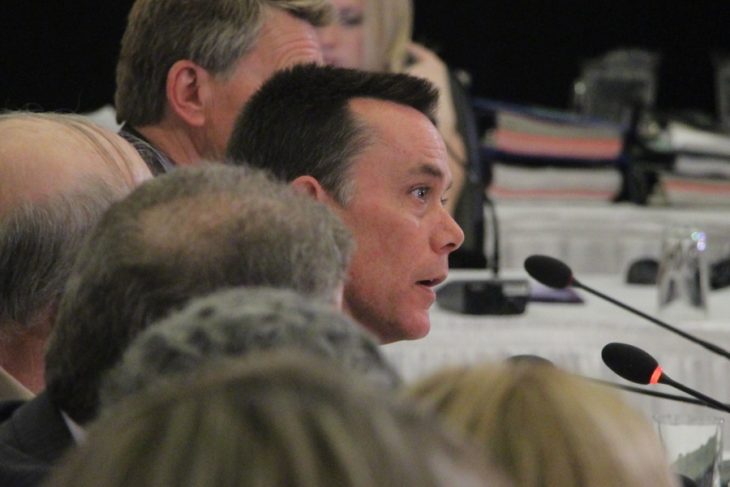
Story and photo by Steve Faguy
MONTREAL – After Telus, Rogers, EastLink, Cogeco and Quebecor, the last word on Bell’s failed relationship with competing BDUs went to the little guys. And they had some eye-opening facts and figures to back up their claims that Bell isn’t playing fair.
“We are not here to engage in regulatory arbitrage,” said Jim Deane, chair of the Canadian Cable Systems Alliance, which represents about 115 small cable companies across Canada. “CCSA members are fighting for their lives.”
Speaking as one of the final interveners in the hearing over Bell Canada?s proposed purchase of Astral Media, the CCSA argued that, despite an arbitrated carriage agreement renewal in 2011, the group cannot negotiate with the media and telecom giant and ?the existing (vertical integration) framework does not work.?
In a discussion that mostly mirrored not only other BDUs’ statements at this hearing and the previous one last fall, but the 2011 mediation process that ended with a final offer arbitration, the CCSA nevertheless offered some numbers to illustrate its point that Bell is using its market power to drive up prices. It said that the new carriage agreement with Bell raised wholesale rates by 33%, and that adding multi platform rights to those services costs their members between five and 20% more on top of that, with the added provision that CCSA members can’t charge their clients extra for multi-platform services.
Even CRTC commissioners seemed taken aback that Bell might set conditions on retail pricing, after repeated assurances by Bell that it had no control over how much cable companies charge their clients for its services.
And the flexible packaging scheme that Bell said it offered them to increase consumer choice, its penetration based rate card? Useless, the CCSA said. “Out of 115 companies, only five have adopted any of the penetration-based rate cards,” said president and CEO Alyson Townsend. Even then, three of the five did so because they were forced to when they wanted to move analog cable channels to digital packages.

The reason is simple math: Wholesale rates for Bell services at low penetration levels can be as much as five to 20 times the wholesale rates for the same services on basic cable, the alliance said.
The CCSA (whose VP regulatory, Chris Edwards, is pictured at right) also took aim at a claim Bell made during the arbitration process in which it said it had signed deals with more than 150 independent distributors.
“We’ve represented independent distributors, 110 of them, for over 20 years,” Townsend said. “I have no idea where those additional 150 independent distributors are, because generally we represent them all.” She added that Bell refused to provide the CCSA with a list of those distributors. “We had no way to find out who they were. There was no ability to examine (that claim). We find that contrary to natural justice, quite frankly.”
According to the CRTC’s Communications Monitoring Report, Canada has 238 licensed BDUs and almost 2,000 exempted ones with fewer than 20,000 subscribers.
Though it said its preference is to deny the transaction outright “in capital bold red letters,” the alliance said that if approved, the CRTC must prohibit things like minimum penetration guarantees and packaging restrictions, overhaul vertical integration rules to make them more clear, and give its policies more teeth, so that Bell and other large companies have to face financial consequences for violating them.
CCSA’s panel included small cable operator members to make their points. One of them, Dean Abbass of Seaside Communications in Nova Scotia, pointed out that his company has to deal with Bell in so many areas ? competitively, as a content provider, as a satellite relay distributor, and as a telephone and Internet wholesaler. He used a colourful metaphor to describe the problem:
“We?re like a flock of chickens who have to rent our hen house from Fox Real Estate, buy our feed from Fox Farm Supplies, and sell our eggs in competition to Foxmart Stores. Now the Foxes want you to let them force us to buy egg cartons, hen scratch, and bedding removal from Astral-Fox Industries.”
“Is it any wonder we?re starting to feel like Sunday dinner?”
Friday, the final day of the hearing, will be devoted entirely to Bell’s replies to the interveners and more Commission questions. It?s not known when a decision will be rendered.


